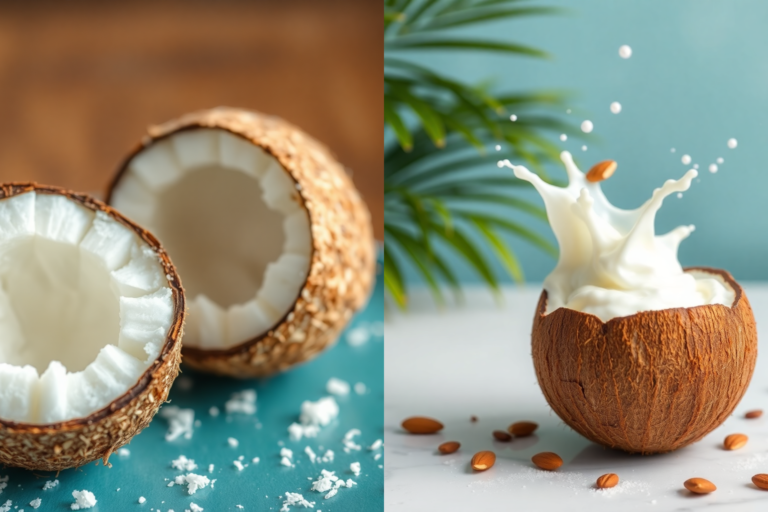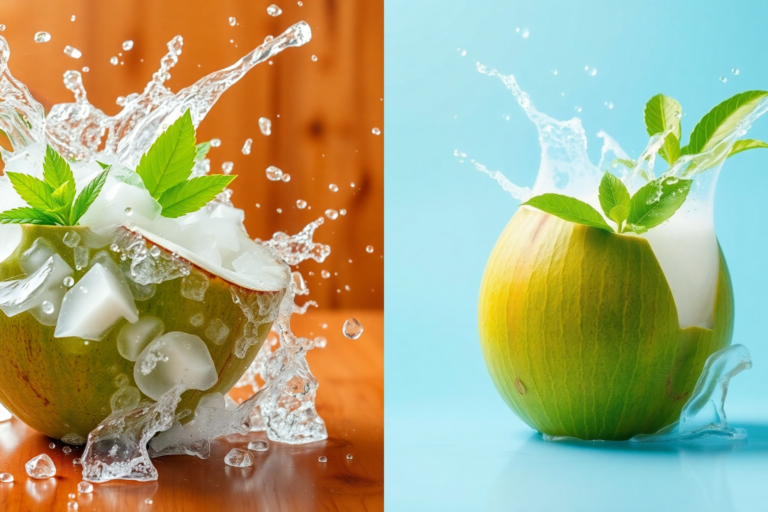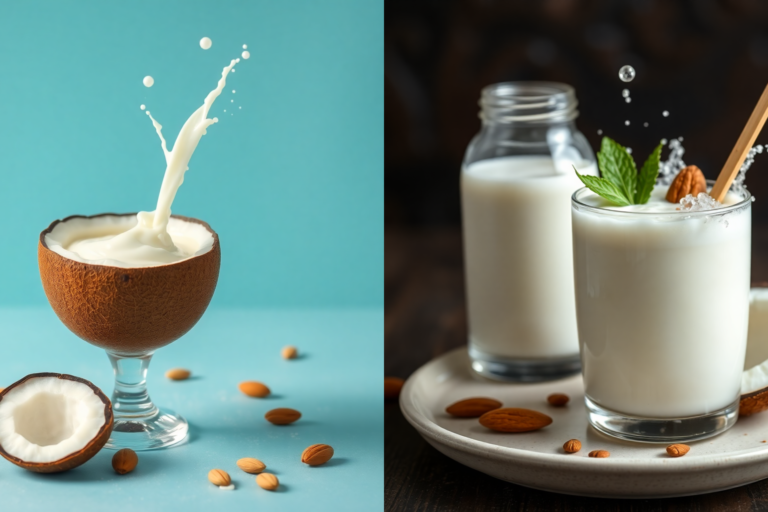Coconut Water Nutrition Facts: Exploring Its Definition and Origins
Introduction of Coconut Water Nutrition Facts
Definition and Origin of Coconut Water
Coconut water, often referred to as nature’s sports drink, is the clear liquid found inside young, green coconuts. It originates from tropical regions where coconuts grow abundantly. This natural beverage has been cherished for centuries for its refreshing taste and hydrating properties.
Overview of Its Popularity as a Natural and Hydrating Beverage
Coconut water has gained immense popularity worldwide as a natural and hydrating beverage. It is celebrated not only for its delicious flavor but also for being low in calories and rich in essential nutrients. Its electrolyte-rich composition makes it a preferred choice for replenishing fluids and staying hydrated.
Coconut Water Nutrition Facts: A Comprehensive Breakdown
Coconut Water Nutrition Facts Overview
Nutritional Composition
Coconut water nutrition facts reveal its impressive nutritional profile. It is naturally low in calories, fat-free, and cholesterol-free, making it a healthy alternative to sugary drinks. Here’s a detailed look at its nutritional benefits:
Electrolyte Content
Coconut water is renowned for its high electrolyte content, including potassium, sodium, magnesium, calcium, and phosphorus. These minerals are vital for maintaining proper hydration, muscle function, and nerve health.
Hydration and Replenishment
Due to its electrolyte composition, coconut water is effective in replenishing fluids and electrolytes lost during physical activities or dehydration. Its isotonic nature ensures quick absorption, making it an excellent choice for post-workout hydration.
Vitamins and Minerals
In addition to electrolytes, coconut water contains essential vitamins such as vitamin C, B-complex vitamins (including riboflavin, niacin, thiamin, and folate), and minerals like iron and zinc. These nutrients support overall health and well-being.
Health Benefits of Coconut Water Consumption
Coconut Water Nutrition Facts: Promoting Wellness and Vitality
Hydration and Exercise Performance
The electrolytes in coconut water support optimal hydration and can improve exercise performance by preventing dehydration and muscle cramps.
Heart Health
Regular consumption of coconut water may help lower blood pressure and cholesterol levels, promoting heart health. Potassium and magnesium in coconut water play crucial roles in maintaining cardiovascular function.
Antioxidant Properties
Coconut water is rich in antioxidants, such as vitamin C, which help combat oxidative stress and protect cells from damage. Antioxidants contribute to overall immune function and skin health.
Incorporating Coconut Water into Your Diet
Coconut Water Nutrition Facts: Tips for Enjoying Its Benefits
As a Refreshing Beverage
Enjoy coconut water chilled on its own as a refreshing beverage, especially after physical activity or during hot weather.
In Smoothies and Cocktails
Use coconut water as a base for smoothies and cocktails to add natural sweetness and electrolytes.
For Cooking and Baking
Substitute coconut water for plain water or other liquids in recipes such as rice dishes, soups, and baked goods to enhance flavor and nutrition.
Coconut Water Nutrition Facts: Hydration and Electrolytes
Introduction to Coconut Water Nutrition Facts
Understanding Coconut Water
Coconut water, derived from young green coconuts, is renowned for its natural hydration properties and impressive electrolyte content. It serves as a refreshing and nutrient-packed beverage enjoyed globally.
Hydration and Electrolytes in Coconut Water Nutrition Facts
High Water Content and Role in Hydration
Coconut water is composed of approximately 95% water, making it an excellent choice for maintaining hydration levels. Its natural isotonic composition ensures quick absorption into the body, effectively replenishing fluids lost through sweat or dehydration.
Rich Source of Electrolytes: Potassium, Sodium, Magnesium
One of the standout coconut water nutrition facts is its abundance of essential electrolytes. It contains significant amounts of potassium, sodium, and magnesium, crucial minerals that support various bodily functions:
Potassium: Helps regulate fluid balance, muscle contractions, and nerve signals. Coconut water typically provides more potassium than a banana, making it an ideal choice for replenishing electrolytes post-exercise.
Sodium: Important for maintaining fluid balance and supporting nerve function. Coconut water contains natural sodium levels that aid in hydration recovery.
Magnesium: Contributes to muscle function, energy production, and bone health. Coconut water’s magnesium content helps prevent muscle cramps and supports overall physical performance.
Benefits of Coconut Water Consumption
Utilizing Coconut Water Nutrition Facts for Optimal Hydration
Post-Exercise Recovery: Replenishes electrolytes lost during physical activity, promoting faster recovery and reducing muscle fatigue.
Hydration Maintenance: Ideal for combating dehydration in hot climates or after intense workouts due to its electrolyte-rich composition.
Heart Health: Potassium in coconut water nutrition facts supports heart function by regulating blood pressure and promoting cardiovascular health.
Digestive Support: Aids digestion and enhances nutrient absorption due to its natural enzymes and electrolytes.
Incorporating Coconut Water into Your Routine
Practical Tips for Hydration with Coconut Water Nutrition Facts
Hydrate Daily: Substitute sugary beverages with coconut water to maintain hydration without excess calories.
Pre-Workout Boost: Drink coconut water before exercise to preemptively replenish electrolytes and enhance performance.
Culinary Uses: Use coconut water as a base for smoothies, cocktails, or as a natural flavor enhancer in cooking and baking.
Coconut Water Nutrition Facts: Exploring Low Calorie and Nutrient Density
Introduction
Defining Coconut Water and Its Origins
Coconut water, the clear liquid found inside young green coconuts, is celebrated for its natural hydration properties and tropical origins. It has gained global popularity as a healthy beverage choice due to its refreshing taste and nutrient-packed profile.
Overview of Coconut Water Nutrition Facts
Coconut water nutrition facts highlight it as a low-calorie, nutrient-dense beverage rich in essential vitamins and minerals. This makes it a preferred option for those seeking hydration without excessive calories.
Low-Calorie Beverage Option
Coconut Water Nutrition Facts: Caloric Content and Benefits
Caloric Content of Coconut Water
Coconut water is naturally low in calories, containing approximately 45 calories per cup (240 ml). This makes it significantly lower in calories compared to many other sweetened beverages.
Ideal for Weight Management
Its low-calorie nature makes coconut water a suitable choice for individuals looking to manage their weight or reduce calorie intake while staying hydrated.
Nutrient-Dense Profile with Vitamins and Minerals
Coconut Water Nutrition Facts: Essential Nutrients for Health
Vitamins Found in Coconut Water
Coconut water is a rich source of vitamin C, a potent antioxidant that supports immune function and skin health. It also contains B-complex vitamins such as riboflavin, niacin, thiamin, and folate, which play vital roles in energy metabolism and overall well-being.
Minerals in Coconut Water
In addition to vitamins, coconut water provides essential minerals including potassium, magnesium, calcium, sodium, and phosphorus. These minerals are crucial for maintaining electrolyte balance, supporting muscle function, and promoting heart health.
Incorporating Coconut Water into Your Diet
Coconut Water Nutrition Facts: Versatile Uses and Recommendations
As a Hydrating Beverage
Enjoy coconut water on its own as a refreshing drink, especially after exercise or during hot weather to replenish electrolytes and stay hydrated.
In Smoothies and Cocktails
Use coconut water as a base for smoothies or cocktails to enhance flavor while adding nutrients and hydration.
In Cooking and Baking
Substitute water or other liquids with coconut water in recipes for rice, grains, soups, and desserts to infuse a subtle coconut flavor and increase nutrient content.
Coconut Water Nutrition Facts: Natural Rehydration Benefits Unveiled
Coconut water, often dubbed nature’s sports drink, is renowned for its exceptional ability to replenish fluids and electrolytes lost during physical activity. Originating from young, green coconuts, this refreshing beverage has become a go-to choice for athletes and fitness enthusiasts seeking natural hydration.
Effectiveness in Replenishing Fluids and Electrolytes
Coconut Water Nutrition Facts: Replenishment Post-Exercise
Coconut water stands out for its electrolyte-rich composition, including potassium, sodium, magnesium, calcium, and phosphorus. These minerals are crucial for maintaining fluid balance and supporting muscle function. After a workout, consuming coconut water helps restore electrolytes lost through sweat, aiding in quick recovery and preventing dehydration.
Comparison with Sports Drinks
In contrast to many commercial sports drinks, coconut water offers a natural alternative without added sugars, artificial flavors, or preservatives. Its isotonic nature means it matches the electrolyte balance of human blood, ensuring rapid absorption and effective hydration without the drawbacks of excess calories or synthetic additives.
Benefits for Athletes and Active Individuals
Enhanced Hydration for Optimal Performance
Athletes benefit from coconut water’s ability to enhance hydration efficiency during intense training sessions or competitions. Its potassium content supports fluid balance and proper muscle contraction, reducing the risk of cramps and fatigue commonly associated with electrolyte imbalances.
Supporting Endurance and Recovery
Regular consumption of coconut water may contribute to improved endurance and faster recovery times due to its natural replenishment of electrolytes and nutrients essential for muscle repair and energy restoration.
Embracing Coconut Water for Enhanced Athletic Performance
Coconut Water Nutrition Facts: Integrating Into Athletic Routines
Pre-Exercise Hydration
Drink coconut water before workouts to prime the body with essential electrolytes and hydration, optimizing performance and stamina.
Post-Exercise Recovery
Immediately after exercise, coconut water aids in rehydrating the body and replenishing electrolytes, promoting quicker recovery and reducing muscle soreness.
Long-Term Health Benefits
Beyond immediate hydration needs, regular consumption of coconut water supports overall health, including cardiovascular function, immune system support, and antioxidant protection, contributing to sustained athletic performance and well-being.
Coconut Water Nutrition Facts: Exploring Antioxidant Properties
Introduction
Understanding Coconut Water and Its Antioxidant Properties
Coconut water, derived from young green coconuts, is not only a natural hydrating beverage but also boasts antioxidant properties that contribute to its health benefits. This article explores the presence of antioxidants like cytokinins and flavonoids in coconut water and their potential for reducing oxidative stress.
Antioxidant Components in Coconut Water
Coconut Water Nutrition Facts: Cytokinins and Flavonoids
Presence of Antioxidants such as Cytokinins and Flavonoids
Coconut water contains various antioxidants, with notable mentions being cytokinins and flavonoids. These compounds are known for their ability to combat oxidative stress by neutralizing free radicals in the body.
Cytokinins: Benefits for Cellular Health
Cytokinins in coconut water play a crucial role in regulating cell growth and division. They help protect cells from damage caused by oxidative stress, thereby promoting overall cellular health and longevity.
Flavonoids: Effects on Free Radicals
Flavonoids are another group of antioxidants found in coconut water. They contribute to reducing oxidative stress by scavenging free radicals, which can otherwise cause cellular damage and contribute to various chronic diseases.
Potential Benefits of Antioxidants in Coconut Water
Coconut Water Nutrition Facts: Reducing Oxidative Stress
Promoting Overall Health and Well-being
By reducing oxidative stress, antioxidants in coconut water may help lower the risk of chronic diseases such as cardiovascular ailments, diabetes, and certain cancers. They support cellular function and contribute to overall vitality.
Skin Health and Aging
Antioxidants play a role in maintaining skin health by protecting against oxidative damage caused by UV radiation and environmental pollutants. Regular consumption of coconut water may contribute to skin elasticity and a youthful appearance.
Anti-Inflammatory Properties
In addition to their antioxidant effects, cytokinins and flavonoids in coconut water exhibit anti-inflammatory properties. They help reduce inflammation in the body, which is linked to various health conditions including arthritis and inflammatory bowel diseases.
Incorporating Coconut Water for Antioxidant Benefits
Coconut Water Nutrition Facts: Enhancing Your Diet
As a Daily Hydration Choice
Choose coconut water as a daily hydration option to benefit from its antioxidant properties while staying refreshed and replenished.
In Detox and Cleanse Programs
Include coconut water in detox diets or cleanse programs to support the body’s natural detoxification processes and enhance antioxidant intake.
For Skin and Hair Care
Use coconut water topically or consume it regularly to support skin hydration and hair health, benefiting from its antioxidant and nutrient-rich profile.
Coconut Water Nutrition Facts: Supporting Digestive Health
Coconut water, derived from young green coconuts, is renowned not only for its refreshing taste but also for its nutritional benefits, including its potential to support digestive health. This natural beverage contains bioactive enzymes like cytokinins, which play a significant role in promoting digestion and enhancing gut health.
Bioactive Enzymes in Coconut Water
Coconut Water Nutrition Facts: Bioactive Enzymes
Cytokinins found in coconut water are bioactive compounds known for their antioxidant and anti-inflammatory properties. These enzymes may aid digestion by promoting the growth of beneficial gut bacteria, supporting a healthy digestive environment.
Potential Benefits for Digestion and Gut Health
Coconut Water Nutrition Facts: Promoting Digestive Wellness
Consuming coconut water regularly may offer several benefits for digestive health:
- Improved Nutrient Absorption: The bioactive enzymes in coconut water can help enhance the absorption of nutrients from food, ensuring optimal nutrient utilization by the body.
- Relief from Digestive Discomfort: Cytokinins and other bioactive compounds in coconut water may help soothe digestive discomfort and reduce inflammation in the gastrointestinal tract.
- Support for Gut Flora: By promoting a balanced gut microbiome, coconut water supports overall digestive function and may contribute to better digestive regularity.
Incorporating Coconut Water into Your Diet for Digestive Health
Coconut Water Nutrition Facts: Practical Tips for Consumption
As a Natural Hydrator
Enjoy coconut water as a hydrating beverage between meals to support digestion and maintain hydration levels.
In Smoothies and Shakes
Blend coconut water with fruits and vegetables in smoothies or shakes for a nutritious and digestive-friendly drink option.
As a Digestive Aid
Drink coconut water after meals to aid digestion and promote the breakdown of food.
Conclusion: Embracing Coconut Water Nutrition Facts for Optimal Health
Recap of the Top 5 Essential Coconut Water Nutrition Facts
1. Hydration and Electrolyte Balance
Coconut water nutrition facts highlight its rich electrolyte content, including potassium, sodium, and magnesium, which replenish fluids and support optimal hydration.
2. Low-Calorie and Nutrient-Dense
With approximately 45 calories per cup (240 ml) and no fat, coconut water is a guilt-free beverage choice packed with essential vitamins, minerals, and antioxidants.
3. Support for Exercise Performance
As a natural hydrator, coconut water enhances exercise performance by preventing dehydration and muscle cramps, thanks to its electrolyte composition.
4. Heart-Healthy Benefits
Studies suggest that regular consumption of coconut water may contribute to lower blood pressure and cholesterol levels, promoting cardiovascular health.
5. Antioxidant and Anti-Inflammatory Properties
Rich in antioxidants like vitamin C, coconut water nutrition facts underscore its role in combating oxidative stress and inflammation, supporting overall well-being.
Encouragement to Include Coconut Water in a Balanced Diet for Hydration and Health
Incorporating coconut water into your daily routine offers a delicious way to stay hydrated and nourished. Whether enjoyed on its own, mixed into smoothies, or used in cooking and baking, coconut water provides a natural source of hydration with added nutritional benefits.
For Hydration Post-Workout
After exercise, replenish electrolytes and fluids with coconut water to support recovery and muscle function.
As a Refreshing Beverage
Sip on coconut water throughout the day as a refreshing alternative to sugary drinks, promoting hydration without added calories.
In Culinary Creations
Use coconut water in recipes for soups, curries, and desserts to impart a subtle coconut flavor while enhancing nutritional content.
As Part of a Balanced Diet
Integrating coconut water into a balanced diet ensures you receive essential nutrients while maintaining hydration levels critical for overall health.
Embracing Coconut Water Nutrition Facts for Optimal Wellness
By embracing the benefits of coconut water nutrition facts, you prioritize hydration and support overall wellness. Whether as a post-workout refresher or a daily beverage choice, coconut water offers a natural solution to staying hydrated while enjoying its nutritious profile.
Make coconut water a staple in your diet and experience the refreshing taste and health benefits it provides. From fitness enthusiasts to those seeking a hydrating alternative, coconut water stands out as a versatile and beneficial addition to any lifestyle.
Embracing Coconut Water Nutrition Facts for Optimal Health
In conclusion, coconut water nutrition facts highlight its role as a hydrating powerhouse packed with essential electrolytes, vitamins, and minerals. Incorporating coconut water into your daily routine supports hydration, enhances exercise performance, and promotes overall health. Whether enjoyed on its own or used in culinary creations, coconut water offers a refreshing and nutritious way to stay hydrated and nourished. Embrace coconut water as part of a balanced diet and experience its numerous health benefits firsthand.











